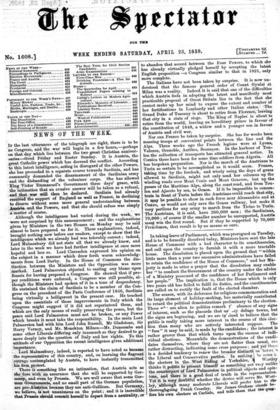NEWS OF THE WEEK.
_IF the last utterances of the telegraph are right, there is to be no Congress, and the war will begin in a few hours,—perhaps on that day which lies between the two great Christian anniver- saries—Good Friday and Easter Sunday. It is Austria, the great Catholic power which has decreed the conflict. According to this latest intelligence, acting in disregard of the other Powers, she has proceeded in a separate course towards Sardinia, and has summarily demanded the disarmament of the Sardinian army and the disbanding of the volunteer corps. She has allowed King Victor Emmanuel's Government three days' grace, with the intimation that an evasive answer will be taken as a refusal, and .that war will then be declared. Sardinia had already received the support of England as well as France, in declining to disarm without some more general understanding between ..Amsiria and the Powers, and that she should refuse was simply _a matter of course.
Although the intelligence had varied during the week, we were not surprised by this announcement ; and the explanations given by Ministers in the two Houses on Monday may be said almost to have prepared us for it. These explanations, indeed, brought nothing new before our readers, except to show that the intelligence which we already had was tolerably correct ; indeed, Lord Malmesbury did not state all that we already knew, and later in the week we have had further intelligence at once more hopeful and less so. Lord Clarendon expressed his opinion on the subject in a manner which drew forth warm acknowledg- ments from Lord Derby. In the House of Commons the dis- tinction between the Ministers and the Opposition was more marked. Lord Palmerston objected to casting any blame upon Russia for having proposed a Congress. He showed that if pro- per conditions were enforced, a Congress was still possible, al- though the Ministers had spoken of it in a tone of despondency. He sustained the claim of Sardinia to be a member of the Con- gress on the precedent of the Paris Conference of 1856, Sardinia being virtually a belligerent in the present case. He touched upon the essentials of those improvements -in Italy which the Congress might suggest if it did not superintend them, and which are the only means of really preserving the peace, but the peace said Lord Palmerston must not be broken, or any Power which breaks it must take the responsibility. In the main Lord Palmerston had with him Lord John Russell, Mr Gladstone, Sir Harry Verney, and Mr. Monekton Milnes—Mr. Duncombe and some other Liberals differing only inasmuch as they desired to go more deeply into the question of Italy and her rights. To this attitude of our Opposition the recent intelligence gives additional importance.
- Lord Malmesbury, indeed, is reported to have acted as became the representative of this country, and, on learning the flagrant outrage contemplated by Austria, to have instantly transmitted his firm protest.
There is something like an intimation, that Austria acts as she does with an assurance that she will be supported by Ger- many, and even by Prussia. We are well aware that some Ger-
man Governments, and no small part of the German population, are pro-Ainstrian because they are anti-Galliean. But Germany, we believe, is not unanimous on the point ; and it is incredible that Prussia should commit herself to depart from a neutrality, or
to abandon that accord between the Four Powers, to which a,he has already virtually pledged herself by accepting the latest English proposition —a Congress similar to that in 1821, only more complete.
The Italians have not been taken by surprise. It is now un- derstood that the famous general order of Count Gyulai at Milan was a reality. Indeed it is said that one of the difficulties which Austria feels in adopting the latest and manifestly most practicable proposal of Great Britain lies in the fact that she cannot make up her mind to expose the extent and number of her fortifications in Lombardy and other Italian states.' '-The Grand Duke of Tuscany is about to retire from Florenee,"leaving that city in a state of siege. The King of Naples is about to retire from the world, leaving an hereditary prince in favour of the constitution of 1848, a widow and a younger son in favour of Austria and civil war.
Nor can France be taken by surprise. She has for weeks been massing troops at convenient points between the line and the Alps. Three weeks ago the French legions were at Lyons, Valence, Grenoble, Antibes, Besancon. In the harbour of Tou- lon the collection of transports has attracted general notice. In Corsica there have been for some time soldiers from Algeria. All has bespoken preparation. Nor is the march of the Austrians to Turin so certain to be accomplished as it would seem. France, taking time by the forelock, and wisely using the days of grace allowed to Sardinia, might not only send her columns up the winding roads over Mont Cenis and Mont Genevre, but up the passes of the Maritime Alps, along the coast road, and from Tou- lon and Ajaecio by sea, to Genoa. If it be impossible to concen- trate in front of Turin before the Austrians could reach that city, it may be possible to show in such force near Alessandria and at Cuneo, as would not only save the Genoa railway, but make it very perilous for any army to march from the Ticino to Turin. The Austrians, it is said, have 200,000 men ; the Sardinians, 70,000 ; of course if the smaller number be unsupported, Austria mutt win the first round. But if they be supported by 70,000 Frenchmen, that result is by no means so sure.


























